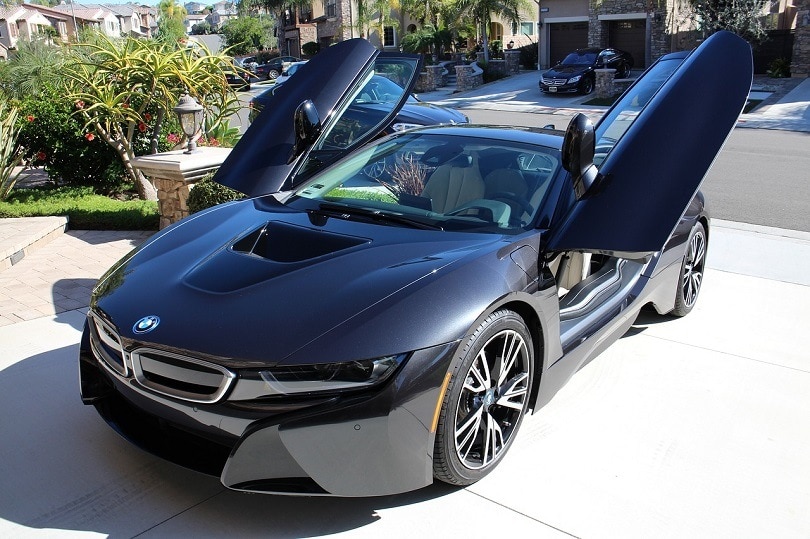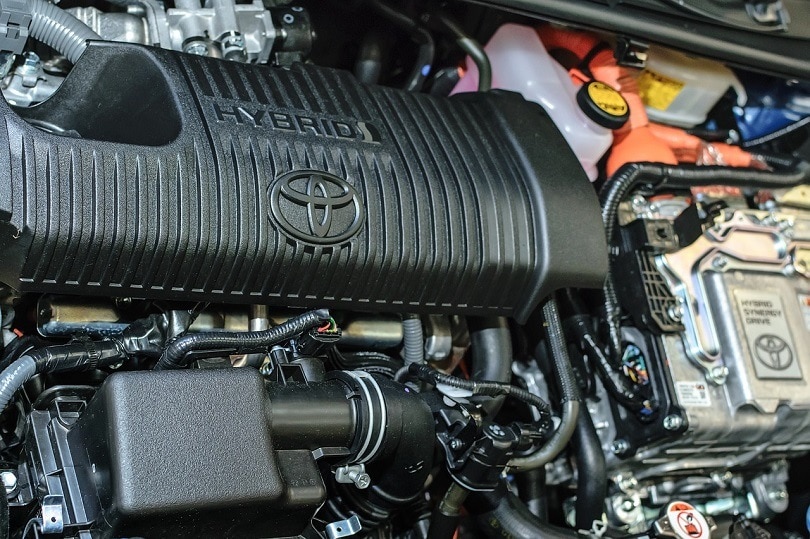Hybrid Cars: What Are the Pros & Cons? (2024 Guide)
-
- Last updated:

When it comes to purchasing a new car, finding a vehicle that is fuel-efficient and economical to run and maintain is high on a lot of people’s list. For these reasons, the popularity of hybrid vehicles has increased significantly in the last few years. If you’re one of those people who is looking to take the plunge on a new hybrid, it’s important to understand a bit about the pros and cons of owning and operating one.

What Is a Hybrid Car?
A hybrid car is one that uses two or more power sources to drive the vehicle. Typically, these power sources are a small internal combustion engine and a larger battery-powered electric motor. Hybrid technology has been around for many years. The first commercially available hybrid car, the Toyota Prius, was released in Japan in 1997, followed by the Honda Insight, which was released in Japan and the US in 1999. Today, hybrid technology is well proven and reliable, and there are many different makes and models of hybrid vehicles available to the consumer.

What Are the Pros of Owning a Hybrid Car?
- Less reliance on gas
Because hybrid cars are more efficient, you will be less dependent on gasoline to keep your vehicle going. Over the life of your vehicle, you will save a significant amount of money compared to a gasoline engine vehicle of the same model. Less reliance on gas also helps to reduce our society’s overall oil consumption, something that will have a compounding effect as more and more people make the switch to hybrid vehicles.
- The braking system helps you use less fuel
Hybrid vehicles use a unique braking design known as regenerative braking, which works by capturing the energy generated during braking and feeding this back into the battery, helping to increase its charge and reduce fuel consumption.
Thanks mainly to their regenerative braking systems, hybrid cars, unlike their gasoline-only cousins, get much better mileage from the constant stop-start of city driving than they do from highway driving. Having to brake and slow down all the time means that while you are driving in the city, there is an almost continuous flow of power back into the car’s battery.
- Hybrid vehicles often come with excellent warranties
The warranty on a new hybrid car is usually considerably better than you will get with a gasoline-powered vehicle.
Typically, a hybrid vehicle’s battery pack and parts will come with a 100,000-mile or 8-year warranty, but some manufacturers are offering 150,000-mile or 10-year warranties.
- Hybrid cars help you drive more efficiently
Hybrid vehicles are made to be driven efficiently, and they will show you when you get it right, and when you don’t.
Generally, vehicles have better endurance when you take it easy on acceleration and braking. And when you drive a hybrid, your dashboard display will help you to do this by continually showing your current and average miles per gallon, as well as how much energy you are recouping through the breaks.
- Hybrid cars are very quiet
The first few times you drive a hybrid car, you may find it a little disconcerting to start the car and not hear a large gasoline-powered engine kick into life. You may even wonder if the car is on at all. Sure, the engine will kick in as your driving, but even then, it will be a lot quieter than in a conventional car.
- Reduced maintenance costs
When you are driving a hybrid vehicle, particularly in and around the city, you’ll find that for much of the time your gasoline engine won’t be running at all. As a result, over the life of the vehicle, there will be a lot less maintenance required. You won’t even need to change the oil as often.
Thanks to the regenerative braking system your hybrid car’s brakes will last longer, as you will be able to drive around all day, hardly ever using the conventional brakes.
- Good resale value
Just as the demand for new hybrid vehicles is quite high, hybrids are also increasingly becoming sought-after vehicles in the used car market. Consequently, these cars tend to hold their value quite well, and you may find that when it comes time to sell, you can get quite a good price for your car.
- You may not need an emissions test
If you live in a state that requires that vehicles undergo emissions testing, you may find that this not required with a hybrid car. However, this isn’t the case everywhere, and you should contact your local DMV to find out for sure.
What Are the Cons of Owning a Hybrid Car?
- They are more expensive to buy
While the price of hybrid vehicles has come down over the years, they are generally still two to three thousand dollars more expensive to buy new than a conventional car of the same make and model. Sure, you will save more than this in running and maintenance costs over the life of the car, but for some people, this increased purchase price may take a hybrid car out of their budgeted price range.
- It costs more to repair a hybrid vehicle
While hybrid vehicles often come with extended warranties, the day will eventually come when you need to make some out-of-pocket repairs to your car. It is at this point that you will likely find out that parts for hybrids can be considerably more expensive than those or conventional vehicles. This may change over time, as we start seeing more and more hybrid cars on the road. However, you need to be prepared to pay more if something that is not covered by the warranty goes wrong with your car.
- Lower highway mileage
As discussed earlier in this article, hybrid vehicles can get their best mileage in the stop-start environment of city driving, which is great if you mostly drive in the city. However, they don’t perform as well if you need to do a lot of highway driving. Hybrids will still be more economical than most cars, but there are increasing numbers of newer compact and diesel-powered vehicles that have better mileage on the open road than most modern hybrids.
- Lower performance
Small, economical engines are great for reducing fuel consumption and saving money, but if you are after a sports car-like performance, you are likely to be disappointed with a hybrid vehicle. Acceleration lag and slower speeds are typical, and unless you are willing to part with some serious change, you’ll be hard-pressed to find a model that is designed for performance.
You will also find that the position of the large, heavy battery in some models will affect the car’s handling, so it may pay to take any hybrid you are looking at for a good, long test drive before you part with your money.
- Poor 12-volt battery
In addition to the large, powerful battery used to drive the electric motor, hybrid cars still come fitted with a 12-volt battery. As with conventional vehicles, this smaller battery powers all the accessories such as the lights and stereo, and just like a traditional car, if your 12-volt battery goes flat, it won’t start.
Unfortunately, the 12-volt battery that is factory-fitted to many hybrids is quite poor, and many hybrid owners have found that they’ve needed to replace this battery within the first few months of owning their car.
- Hybrid vehicles are more expensive to insure
It will generally cost you more for insurance with a hybrid vehicle than a conventional gasoline-powered car of the same make and model. This is the case for two reasons. Firstly, they are more expensive to buy and thus more expensive to replace: and secondly, the parts also tend to be more expensive. Insurance companies know this, and these additional expenses are factored into your insurance premium.
- There are not many options for large cars
While it is starting to change, there are still very few larger car models that are available as hybrids. As such, if you are looking for a large family car, when it comes to buying a hybrid, you will be limited in choice.
- Hybrids are in high demand
Hybrid vehicles are very popular, and many dealers have trouble keeping up with the demand. Consequently, there’s rarely much room for negotiation when it comes to price, and you can virtually forget about trying to get yourself a bargain.
Additionally, you may find that the model you are after is out of stock and you will have to wait several months for your new car to be delivered.
Featured Image Credit: BMW by rezaqorbani, Pixabay

